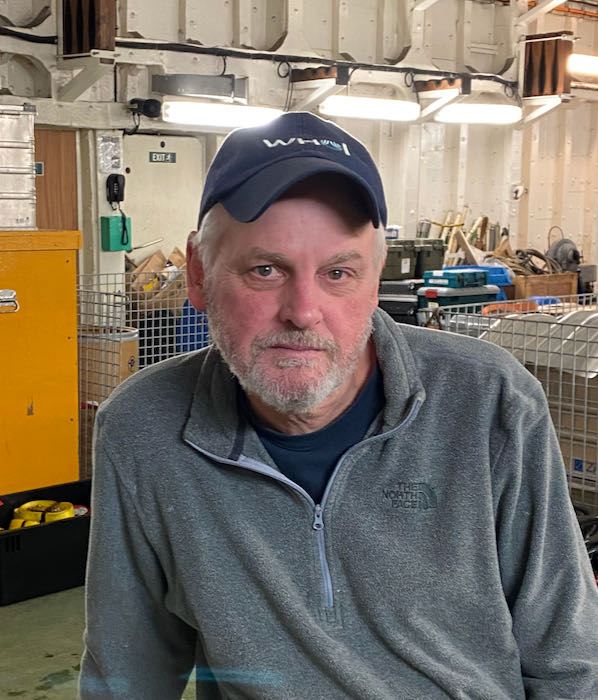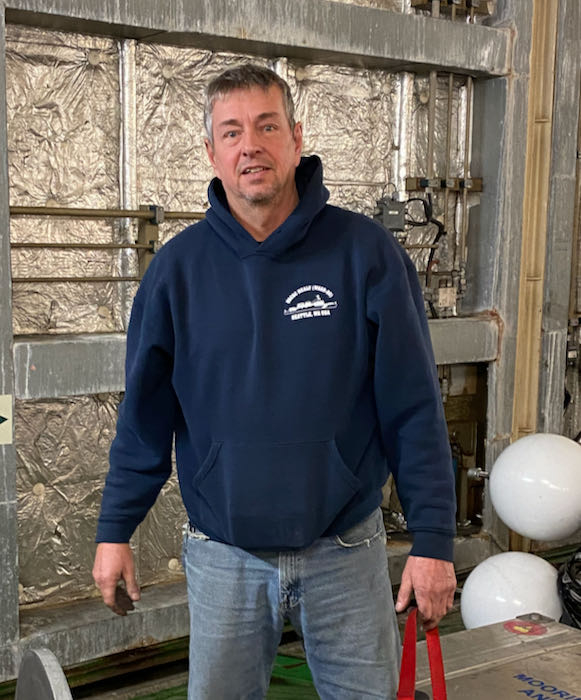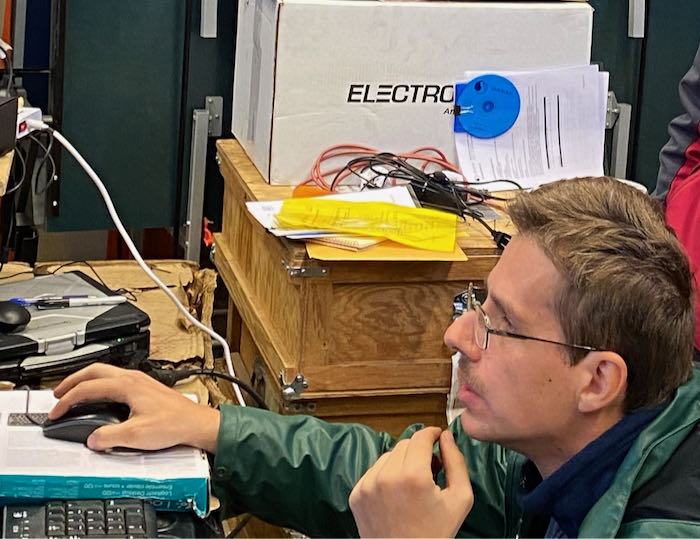All good parties need a good play list and ambiance, and the Science Party is no different. While these guys don't spin discs or use Source 4s or Sharpies (thanks to my son Jonah for the lighting background), the technicians for the expedition keep everything running, from computer programming to moorings (See my 9-23-21 Journal for a description of their work). They spend hours outside in all weather conditions with a variety of heavy machinery to put the equipment in place so the scientists can collect their data.
John Kemp - Technical Group Team Leader

Background: Hometown - Plymouth, MA; Current Position: Woods Hole Oceanographic Institution (WHOI) - MooringAn anchor or weight attached to the sea floor used to hold a scientific instrument in place. Operations and Engineering. John has been "on the water" on fishing boats since age 10. He enrolled in the Mass Maritime Academy but left after 1 year because the military aspect wasn't a good fit. He read about a WHOI lab assistant position in acoustics, applied and called repeatedly until he got the job! He has been at WHOI for 43 years.
Why the Arctic? John did one Arctic trip with WHOI and knew he wanted to spend the rest of his career there. He had to break into the Arctic cliques, and once he did, he has been able to design and engineer moorings and systems for many expeditions.
Best Parts of the Job: His team - he has been able to surround himself with hard-working go-getters (many of them taught on-the job), and they have a very tight-knit group. Worst Parts of the Job: Overwhelming amount of work - once WHOI reopened after COVID, he has been swamped.
Advice to 16 Year-old Self: No risk, no glory, and don't be afraid to fail.
Jim Dunn - MooringAn anchor or weight attached to the sea floor used to hold a scientific instrument in place. Technician

Background: Hometown - Newton, MA; Current Position: Woods Hole Oceanographic Institution (WHOI) - MooringAn anchor or weight attached to the sea floor used to hold a scientific instrument in place. Operations and Engineering. Jim has been also been "on the water" for most of his life. He worked on charter boats in Cape Cod, as well as in construction with his father. He attended trade school for high school in marine services and after graduating joined the Coast Guard (but never served because of an injury); He applied to WHOI and worked in security and landscape construction before landing a job in the Technical Department.
Why the Arctic? Jim has spent more than 30 years at sea, averaging 120-130 days a year. He, too, was bitten by the "Arctic bug" and enjoys the extreme environment and the challenges from working here.
Best Parts of the Job: Variety - every job is different. Worst Parts of the Job: Long trips - he has missed various life events.
Advice to 16 Year-old Self: Pay more attention to what your Dad tells you.
Entertainment for the Ship: Movies - Catch Me if You Can, No Angel.
Andrey Pnyushkov - Scientist

Background: Hometown - St. Petersburg, Russia; Bachelors and Masters - Russian States Hydrometerological University - St. Petersburg, Russia; PhD - Arctic and Antarctic Research Institute (AARI) - St. Petersburg, Russia; Post-Doc and Current Position - Research scientist - University of Alaska Fairbanks (UAF)/ International Arctic Research Consortium (IARC) - Fairbanks, AK.
Why the Arctic? Andrey's high school had a partnership with the Russian States Hydrometerological University, and he went to lectures and received special training. He did his academic work in modeling of physical oceanographic systems and focused on the Arctic. He has been studying it ever since.
Advice to 16 Year-old Self: Keep doing what you're doing.
Comfort Items for the Ship: Historical Movies - Troy, Odyssey, Gladiator.
These men, along with "career ocean-going, ping-pong playing, long-distance cycling, technician" Jack Greenburg, are the reason that the scientists can do their jobs.


Comments